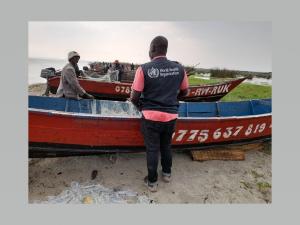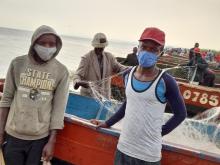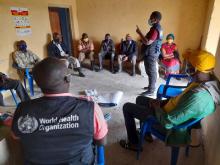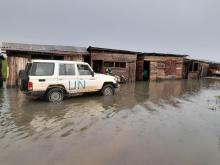WHO Takes the COVID-19 Message to Rwenshama Landing site, one of Uganda’s Hard-to-Reach Areas
At about 4:00 pm, a team from the field support team from the World Health Organization (WHO) meets Fahad Barigira, a 24-year-old man on the shores of Lake Edward. He is getting ready for his next fishing shift which starts at 5:00 pm and ends at 7:00 am the next day.
Fahad is married with one child and has spent three years as a fisherman on the lake. He is part of a three-man fishing crew which includes his brother and a friend.
There is a noticeable rise in the water level and indeed the WHO team drove a flooded road to reach this place. “Every day for the last three months, the water attacks homes, when it rains, at night, and even when the tide rises. I don’t feel safe because it is not healthy when the floods come,” says Fahad.
His fears are shared by Ms Safinah Bukenya, a Village Health Team (VHT) member supporting COVID-19 screening at the landing site. “I worry about my children getting malaria or bilharzia, especially now that they are home and not going to school, they play in the water all the time,” she says.
Luckily, the District Health Office has commenced vaccination against Bilharzia in the community, but not everyone is covered by the exercise. Majority of the people are yet to receive the vaccines.
Nearby, a restaurant owner, Ms Addy Kyomukunda prepares food on a makeshift raised wooden platform in a shack that used to be her restaurant, customers come in for a quick meal of fish stew.
Unbothered by the knee-high water levels, they hurriedly eat their meals. In an interaction with the WHO team, she says, “this is my only source of income, it’s the only thing I know how to do ever since I was a young girl, if I could, I would find other ways to make money.”
Worryingly, more customers wade through the water as they enter Addy’s restaurant, unbothered by the water and the stale stench of stagnant water and rotting fish.
The heavy rains and a very low water table means that several latrines in the community have since collapsed. In addition, the households cannot dig new latrines so they requested support in the form of eco-san latrines to help in the meantime. The health assistant based at the health centre concurs with this request.
“If you can help us with the improved eco-san latrines, we would be very grateful, people are defecating in the open and in the water near their homes, anytime, cholera or dysentery will break out here,” Health Assistant Mr Mukundenta Kenneth.
Served by just four functional latrines, the landing site is in great danger of experiencing yet another cholera outbreak or other diarrheal diseases. This last occurred in 2009 and it claimed many lives as attested by Mr Arinaitwe Muhamadi, the chairman of the local area.
“The last time we had cholera here, it was very bad and we suffered so much, if we can prevent this from happening again, this would be good, we have the local power but we also need support.” However, due to the COVID-19 outbreak, accessing resources has not been easy yet the water will not recede until June or July when the next cycle of the dry season begins.
For a fishing village with a total population of 2,300, the VHTs remained committed to supporting the community access health services. They continue to man screening points, carry out community sensitization and distributes medicines despite the hardships.
Following the field visit, the WHO team has since sensitized 910 members of the community together with the leaders on the underlying health risks and concerns and COVID-19. Community feedback has been invaluable in these activities.
As a result, the local leaders agreed to form three committees to cater to the health issues, enforcement of guidelines and general community health sensitization in order to address the health concerns in the village.
The WHO team also donated an assortment of Infection Prevention and Control materials.
While briefing the Chief Administrative Officer, Mr Elias and the District Health Officer, Dr Akasiima Mucunguzi, they both agree that these are big challenges that need to be addressed soon. Mr Elias has since visited the landing site and assessed the situation.
Health Promotion Advisor
Tel. : +256 414 335505
Cell: +256 772 507906
Email: sensasib [at] who.int (sensasib[at]who[dot]int)
Public Information Officer
Tel. : +256 313 335569
Cell: +256 786 497073
Email: mwebembezie [at] who.int (mwebembezie[at]who[dot]int)






